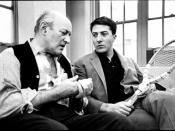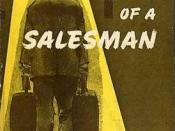In Arthur Miller's Death of a Salesman, two very different approaches to success and "the American Dream" were presented. Willy Lowman presented one approach, and Charley, Willy's neighbor, showed the other.
Willy's idea of a successful man was always of a "well liked" and "personally attractive" man. He repeatedly remarked to his sons, Biff and Happy, that because they were popular and good-looking they would have bright futures. He tells them to "be liked and you will never want". He never taught them that in order for anyone to be successful they must work hard. When Bernard, Charley's son, tried to make Biff study math, Willy told him to "stop being an anemic", because Biff was a big football star with "scholarships to three universities" which meant that, they could not "flunk" him. He even told Bernard to "give him the answers". As we find out later, Biff does fail math and does not graduate.
He had an opportunity to go to summer school, but did not take it because he found out about his father's affair with a woman in Boston. For the rest of his life, Biff never accomplished anything. He went from job to job. Happy had a job but made it out to be more important than what it really was just as Willy had always done. Willy, Biff, and Happy were always talking about what would happen in the future, and they never put any thought and energy to making something of their lives in the present.
On the other hand, Charley was a "man of few words". Charley never boasted about his accomplishments; instead, he actually worked hard. He owned his own business, and when Willy was not making a salary, he gave him money. Throughout the play, we hear Willy boast about...


